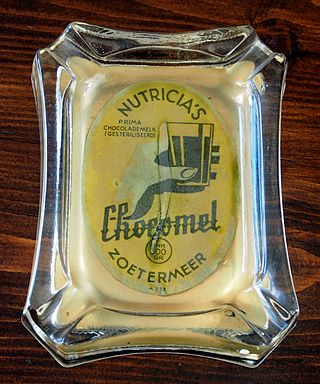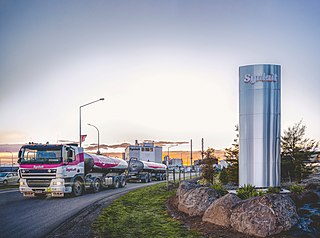Related Research Articles

Dairy products or milk products, also known as lacticinia, are food products made from milk. The most common dairy animals are cow, water buffalo, nanny goat, and ewe. Dairy products include common grocery store food around the world such as yogurt, cheese, milk and butter. A facility that produces dairy products is a dairy. Dairy products are consumed worldwide to varying degrees. Some people avoid some or all dairy products because of lactose intolerance, veganism, environmental concerns, other health reasons or beliefs.

Botulism is a rare and potentially fatal illness caused by botulinum toxin, which is produced by the bacterium Clostridium botulinum. The disease begins with weakness, blurred vision, feeling tired, and trouble speaking. This may then be followed by weakness of the arms, chest muscles, and legs. Vomiting, swelling of the abdomen, and diarrhea may also occur. The disease does not usually affect consciousness or cause a fever.

Danone S.A. is a French multinational food-products corporation based in Paris. It was founded in 1919 in Barcelona, Spain. It is listed on Euronext Paris, where it is a component of the CAC 40 stock market index. Some of the company's products are branded Dannon in the United States.

Fonterra Co-operative Group Limited is a New Zealand multinational publicly traded dairy co-operative owned by New Zealand farmers. The company is responsible for approximately 30% of the world's dairy exports and with revenue exceeding NZ $22 billion, making it New Zealand's largest company. It is the sixth-largest dairy company in the world as of 2022, as well as the largest in the Southern Hemisphere.

Powdered milk, also called milk powder, dried milk, or dry milk, is a manufactured dairy product made by evaporating milk to dryness. One purpose of drying milk is to preserve it; milk powder has a far longer shelf life than liquid milk and does not need to be refrigerated, due to its low moisture content. Another purpose is to reduce its bulk for the economy of transportation. Powdered milk and dairy products include such items as dry whole milk, nonfat (skimmed) dry milk, dry buttermilk, dry whey products and dry dairy blends. Many exported dairy products conform to standards laid out in Codex Alimentarius.

Anchor is a brand of dairy products that was founded in New Zealand in 1886, and is one of the key brands owned by the New Zealand–based international exporter Fonterra Co-operative Group. In Malaysia, Singapore and Taiwan, Fonterra uses the Fernleaf brand instead of Anchor.

A2 milk is a variety of cows' milk that mostly lacks a form of β-casein proteins called A1, and instead has mostly the A2 form. Cows' milk like this was brought to market by The a2 Milk Company and is sold mostly in Australia, New Zealand, China, and the United States. It was sold in the United Kingdom between 2012 and 2019. Non-cow milk, including that of humans, sheep, goats, donkeys, yaks, camels, buffalo, and others, also contain mostly A2 β-casein, and so the term "A2 milk" is also used in that context.

Nutricia is a Danone brand that specialises in therapeutic food and infant formula, including medical nutrition for babies with specific needs.
In China, the adulteration and contamination of several food and feed ingredients with inexpensive melamine and other compounds, such as cyanuric acid, ammeline and ammelide, are common practice. These adulterants can be used to inflate the apparent protein content of products, so that inexpensive ingredients can pass for more expensive, concentrated proteins. Melamine by itself has not been thought to be very toxic to animals or humans except possibly in very high concentrations, but the combination of melamine and cyanuric acid has been implicated in kidney failure. Reports that cyanuric acid may be an independently and potentially widely used adulterant in China have heightened concerns for both animal and human health.

Westland Milk Products is a dairy company based in Hokitika, New Zealand. It has been owned by Chinese dairy company Yili Group since 2019. It is the third largest dairy processor in New Zealand with a 3.4% market share.
Sanlu Group CO., Ltd. (SJZSGCZ) was a Chinese dairy products company based in Xinhua District, Shijiazhuang, the capital city of Hebei. It produced one of the oldest and most popular brands of infant formula in China. New Zealand's Fonterra owned 43% of Sanlu.

The 2008 Chinese milk scandal was a significant food safety incident in China. The scandal involved Sanlu Group's milk and infant formula along with other food materials and components being adulterated with the chemical melamine, which resulted in kidney stones and other kidney damage in infants. The chemical was used to increase the nitrogen content of diluted milk, giving it the appearance of higher protein content in order to pass quality control testing. 300,000 affected children were identified, among which 54,000 were hospitalized, according to the latest report in January 2009. The deaths of six babies were officially concluded to be related to the contaminated milk.
Guangdong Yashili Group Co., Ltd. is a leading privately owned infant formula and soymilk products company in China. Based in Chaoan in the Chaozhou region of the Guangdong Province, China and, incorporated in the Cayman Islands. The company also has a Hong Kong-listed entity Yashili International Holdings Limited.
This timeline of the 2008 Chinese milk scandal documents how events related to the Chinese dairy products contamination by melamine unfolded. Complaints about kidney problems traced back to a brand of infant formula, subsequent discoveries of melamine contamination of liquid milk, and exported powdered milk of processed food products. The scandal decimated Chinese dairy exports, and re-exposed long-standing concerns about food security, corruption, lack of political checks and balances. Though the scandal came to attention in 2008, its roots can be traced back to events prior to 2008.

Synlait Milk Ltd. is a New Zealand dairy processor selling dairy and plant-based nutritional products, ingredients and powders to multinational customers worldwide. It is headquartered in Dunsandel, Canterbury, with additional manufacturing sites in Auckland and Pōkeno, a Research and Development Centre in Palmerston North and offices in Beijing and in Shanghai. The company manufactures milk powders and foodservice products such as infant formula, adult and early life nutrition products, ingredients such as lactoferrin and foodservice products such as UHT cream.

The a2 Milk Company Limited is a dual listed NZX and ASX 50 public listed company that commercialises intellectual property relating to A1 protein-free milk that is sold under the a2 and a2 Milk brands, as well as the milk and related products such as infant formula.
Lawrence Kenneth Creamer was a New Zealand chemist specializing in milk protein chemistry. In 2004, he received the International Dairy Federation Award.

Lanka Milk Foods (CWE) PLC is a dairy products manufacturing company in Sri Lanka. Lanka Milk Foods was a subsidiary of the Co-operative Wholesale Establishment (CWE) which later converted to a joint-stock company. The company was incorporated in 1981 and listed on the Colombo Stock Exchange in 1983 with Sri Lankan Government holding the majority of the shares. The Stassen Group acquired a controlling stake of 51% in the company in 1991. Lanka Milk Foods's subsidiary, Lanka Dairies, introduced flavoured ready-to-drink milk to the market in 1996. Ambewela Farm and New Zealand farm were acquired by Lanka Milk Foods in 2001. In 2020, the company planned to invest LKR3 billion in a new dairy farm in Ambewela to expand production. Lanka Milk Foods is one of the LMD 100 companies in Sri Lanka. Lakspray, a Lanka Milk Foods brand listed among the 100 most valuable brands in Sri Lanka in 2020. Lanka Milk Foods stand to benefit from consumers switching from milk powder to fresh milk.
References
- ↑ Gyles Beckford (14 August 2013). "Fonterra's milk products chief resigns after botulism scare". Reuters.
- 1 2 Grey, Jamie (28 August 2013). "Fonterra botulism crisis was false alarm". The New Zealand Herald.
- 1 2 3 4 5 "New Zealand botulism scare triggers mass global recall". Fox News Channel. Associated Press. 3 August 2013. Retrieved 4 August 2013.
- 1 2 3 4 5 6 7 8 9 Gerry Mullany (3 August 2013). "Botulism Threat Found in Infant Formula Ingredients". The New York Times. Retrieved 4 August 2013.
- 1 2 3 4 5 "China Bans Milk Powder From New Zealand Over Botulism Fears". The New York Times. Reuters. 4 August 2013. Retrieved 4 August 2013.
- 1 2 3 4 Rebecca Howard (4 August 2013). "Companies Recall Products After Fonterra Warning". The Wall Street Journal. Retrieved 4 August 2013.
- ↑ "Students who drank whey 'not at risk'". Radio New Zealand. 9 August 2013. Retrieved 11 August 2013.
- ↑ Espiner, Colin (7 August 2013). "Mr Fixit in charge of dairy scare". Stuff/Fairfax. Archived from the original on 11 August 2013. Retrieved 11 August 2013.
- ↑ "Fonterra apologises but Govt not satisfied". Stuff/Fairfax. 9 August 2013. Retrieved 11 August 2013.
- ↑ Small, Vernon (10 August 2013). "Dairy scare questions trouble Govt". Stuff/Fairfax. Retrieved 11 August 2013.
- ↑ "China bans New Zealand milk powder imports". Australia Network News. 4 August 2013. Retrieved 16 August 2013.
- ↑ Nadira Gunatilleke (8 August 2013). "STRICTLY NO MILK POWDER ADVERTS | Daily News Online : Sri Lanka's National News". Dailynews.lk. Archived from the original on 9 August 2013. Retrieved 16 August 2013.
- ↑ "Anchor, Maliban and Diamond milk powder off the shelves | Breaking News". Dailymirror.lk. 7 August 2013. Retrieved 16 August 2013.
- ↑ "CA bars Fonterra from advertising products 100% perfect | Breaking News". Dailymirror.lk. 8 August 2013. Retrieved 16 August 2013.
- ↑ Vance, Andrea (11 August 2013). "Fonterra rubbishes Sri Lankas flawed testing". Stuff/Fairfax. Retrieved 11 August 2013.
- ↑ Fonterra in talks with Nutricia owners Archived 4 October 2013 at the Wayback Machine . 3 News NZ. 2 October 2013.
- ↑ Rutherford, Hamish (4 April 2014). "Fonterra fined $300k for botulism scare".
- ↑ "Investigations continue into Fonterra botulism scare". 3 News. 12 May 2014. Archived from the original on 13 May 2014. Retrieved 12 May 2014.